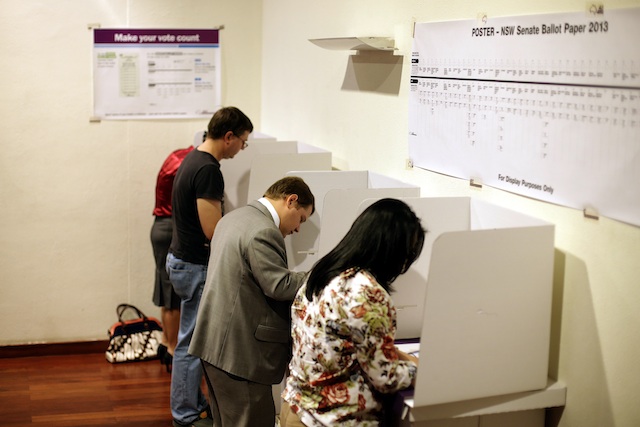SUMMARY
This is AI generated summarization, which may have errors. For context, always refer to the full article.

SYDNEY, Australia – From the frozen Antarctic to the dry and remote Outback, millions of Australians will cast their ballots on Saturday in an election that poses logistical challenges in a continent-sized country.
Voting is compulsory and a record 14.71 million Australians are registered to make their mark at some 7,500 polling booths set up at schools, surf clubs, church halls and community centers.
But finding somewhere to vote for either incumbent Prime Minister Kevin Rudd’s Labor party, the conservative opposition of Tony Abbott or more than 50 other minor parties is not always easy.
With many people living in far-flung locations, 38 polling teams began criss-crossing the enormous country two weeks ahead of the September 7 polling day to reach more than 400 isolated communities.
Residents of Warruwi, a Northern Territory Aboriginal community on South Goulburn Island, were among the first to cast their ballots.
Electoral Commissioner Ed Killesteyn said the teams expected to cover more than 3.4 million square kilometers by road, air and sea to reach pastoral properties, small towns, tourist resorts and mine sites.
“A large proportion of people who vote via the Australian Electoral Commission’s remote mobile polling service live in indigenous communities with the majority in the Northern Territory,” he said.
“There are about 220 electors on the roll in Warruwi. However there are many other smaller communities, such as Mulga Bore (40 voters) and Camel Camp (23 voters) that the AEC also has a responsibility to support this election.”
Anyone who fails to vote faces fines of up to $170.
Distance no excuse
Even working and living in one of the most isolated places in the world — Antarctica — is no excuse, despite being 5,500 kilometers (3,400 miles) away from the nearest official polling booth in Tasmania.
The 53 scientists and support staff based at the Antarctic stations of Casey, Davis, Mawson and Macquarie Island must all vote, sending their ballots by ship or via a designated polling officer on site who will phone their decisions through.
Australian Antarctic Division station leader Allan Cooney said it was the first time he was voting in a federal election away from home, and the first time from the Antarctic.
While having only a “watching interest” in topical matters back home, he said voting was very important.
“Voting is a key component to the quality of life we enjoy as Australian citizens in a strong democratic country,” he said, adding that Antarctic staff would stay in touch with the election results online.
“I will be checking how things are going from time to time,” he said.
“We don’t have live broadcast options here for television, but there is a delayed option.”
Massive operation, high turnout
Soldiers serving in Afghanistan and other global hotspots also need to vote, with their ballots being sent back via diplomatic bags.
One of the busiest polling stations isn’t even in Australia.
During the last election in 2010, more than 16,000 people — tourists and expatriates — cast their ballots at the Australian embassy in London, and another 7,700 in Hong Kong. Similar figures are expected this time.
In multicultural Australia where thousands of people do not speak English well, an official guide to the election is being distributed to every household, translated into 26 languages including Arabic, Burmese, Dinka (a Sudanese dialect) and Assyrian.
It is part of a massive operation — that also involves 50,000 ballot boxes being produced, 100,000 pencils provided, and 43 million ballot papers printed — to ensure everyone eligible votes.
Despite the logistical difficulties, Australians overwhelmingly abide by their obligation to vote, with a more than 90% turnout in 2010 when Labor’s Julia Gillard beat Abbott after forming a coalition after neither major party scored an outright win. – Rappler.com
Add a comment
How does this make you feel?
There are no comments yet. Add your comment to start the conversation.